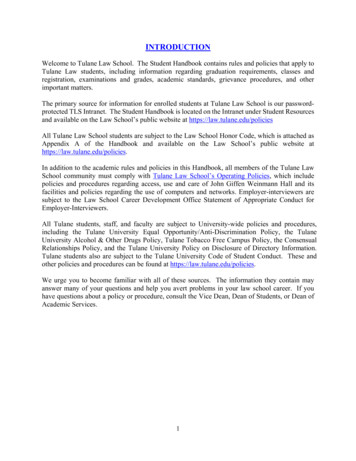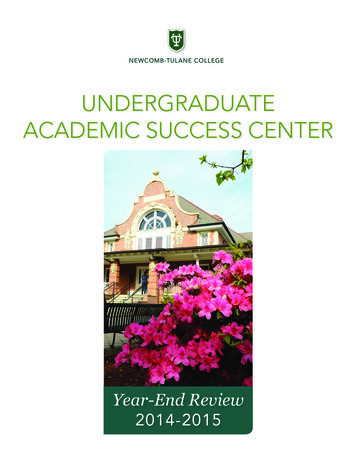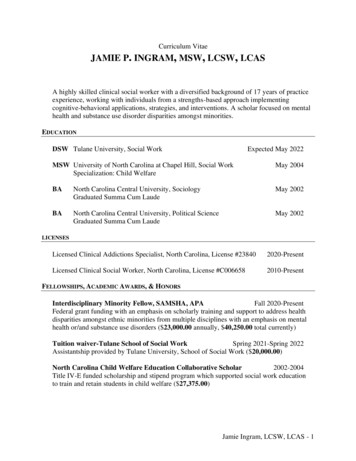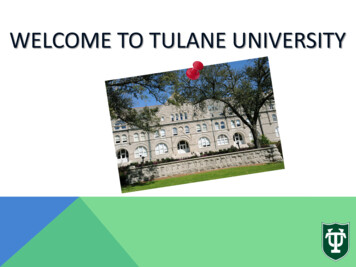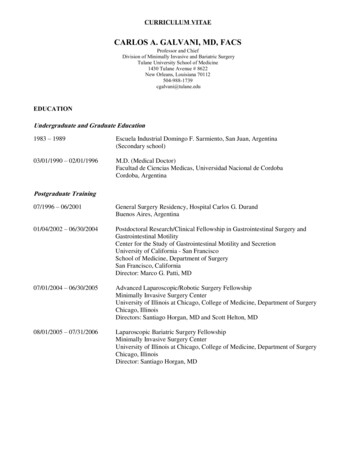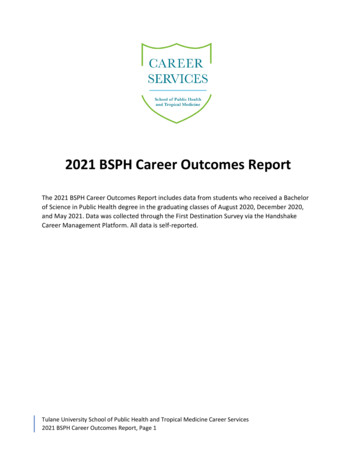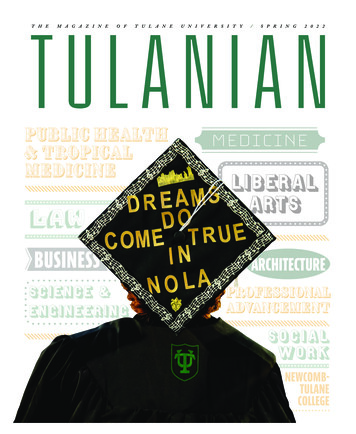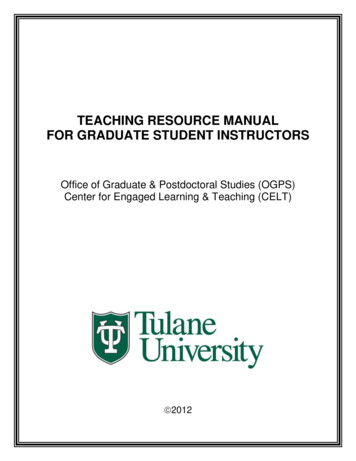
Transcription
MARTIN K. DIMITROVProfessor of Political ScienceOffice: 305 Norman MayerTulane University, New Orleans, LA 70118Phone: (603) 277-0195Email: mdimitro@tulane.eduEDUCATIONStanford University, Ph. D. in Political Science, March 2004.Dissertation Title: Administrative Decentralization, Legal Fragmentation, and the Rule ofLaw in Transitional Economies: The Enforcement of Intellectual Property Rights Laws inChina, Russia, Taiwan, and the Czech Republic (Dissertation Adviser: Jean C. Oi)Franklin and Marshall College, BA (Magna Cum Laude), June 1998, double major inGovernment and French, minor in Asian Studies. Phi Beta Kappa, inducted 1997.Related TrainingEmpirical Implications of Theoretical Models (EITM) Summer Institute, Washington Universityin St. Louis, 2004.Inter-University Board for Chinese Language Studies, Tsinghua University, Fall 2001-2002,Spring 2000-2001, Summer 1999.International Chinese Language Program, National Taiwan University, June-August 2000.ACADEMIC APPOINTMENTSTulane University, Professor of Political Science, July 1, 2019-present.Tulane University, Associate Professor of Political Science, July 1, 2011-June 30, 2019.Tulane University, Director, Asian Studies Program, January 1, 2014-June 30, 2016.Dartmouth College, Assistant Professor of Government, 2004-2011.Other Positions and AffiliationsProblems of Post-Communism, Associate Editor for Asia, 2014-present.Davis Center for Russian and Eurasian Studies, Harvard University, Associate, 2004-2020.Chair, Working Group on the Resilience of Authoritarianism, Holbrooke Forum for the Study ofDiplomacy and Governance Statecraft in the 21st Century, American Academy in Berlin,2014-present.Princeton Institute for International and Regional Studies, Visiting Research Scholar, 2016-2017.Aleksanteri Institute, Helsinki (Finland), Visiting Fellow, May 2016, May-June 2014, August2013.National Committee on U.S.-China Relations, Public Intellectuals Program, Fellow, 2011-2013.American Academy in Berlin, Axel Springer Fellow, Spring 2012.University of Notre Dame, Institute for Advanced Study, Distinguished Guest Fellow, Fall 2011.Woodrow Wilson International Center for Scholars, Resident Fellow, 2010-2011.Harvard University, Fairbank Center for Chinese Studies, An Wang Post-Doctoral Fellow,September 1, 2005-June 30, 2006.Harvard University, Davis Center for Russian and Eurasian Studies, Post-Doctoral Fellow,February 1-June 30, 2004.Harvard Law School, East Asian Legal Studies Program, Research Fellow, 2004-2013.Harvard University Center for the Environment, Fellow, 2005-2007.Stanford University, Center on Democracy, Development and the Rule of Law, Fellow, 2003.
Dimitrov CV 12/12/2019 -2 PUBLICATIONSBooks1) Piracy and the State: The Politics of Intellectual Property Rights in China (New York:Cambridge University Press, 2009 [paperback edition 2012]). Reviewed in ForeignAffairs, China Quarterly, Journal of Asian Studies, Journal of East Asian Studies, andEurope-Asia Studies.2) Politicheskata logika na sotsialisticheskoto potreblenie [The Political Logic of SocialistConsumption] (Sofia: Institute for Studies of the Recent Past and Ciela Publishers, July2018).Books in Progress3) Dictatorship and Information: Autocratic Regime Resilience in Communist Europe and China4) Welfare DictatorshipsEdited Volumes and Special Journal Issues5) Why Communism Did Not Collapse: Understanding Authoritarian Regime Resilience in Asiaand Europe (New York: Cambridge University Press, 2013). Reviewed in Choice,Pacific Affairs, Russian Review, Europe-Asia Studies, Perspectives on Politics, and 二十一世紀.6) Media Control in China, special issue of Problems of Post-Communism 64:3-4 (2017), 121213 (conceptualized, commissioned, edited, and with an introductory article by me on“The Political Logic of Media Control in China,” 121-127).Edited Volumes in Progress7) China-Cuba: Trajectories of Post-Revolutionary Governance.8) Popular Authoritarianism: The Quest for Regime Durability.Peer-Reviewed Articles9) “Die Entwicklungspfade der Wirtschaftsreformen in China und Kuba,” Jahrbuch fürHistorische Kommunismusforschung JHK 2020 (forthcoming)10) “The Functions of Letters to the Editor in Reform-Era Cuba,” Latin American ResearchReview, 54:1 (2019), 1-15 [lead article].11) “The Social Contract Revisited: Evidence from Communist and State Capitalist Economies”(co-authored with Linda Cook), Europe-Asia Studies, 69:1 (2017), 8-26.12) “1989 in China and Eastern Europe in Diachronic Perspective,” Divinatio 44 (SpringSummer 2017), 55-71.
Dimitrov CV 12/12/2019 -3 -13) “Structural Preconditions for the Rise of the Rule of Law in China,” Journal of ChineseGovernance 1:3 (2016), 470-487.14) “Internal Government Assessments of the Quality of Governance in China,” Studies inComparative International Development 50:1 (March 2015), 50-72.Initially published as Working Paper 126 (April 2013), Center on Democracy,Development and the Rule of Law (CDDRL), Stanford University15) “What the Party Wanted to Know: Citizen Complaints as a ‘Barometer of Public Opinion’ inCommunist Bulgaria,” East European Politics and Societies and Cultures 28:2 (May2014), 271-295 [lead article].16) “State Security, Information, and Repression: A Comparison of Communist Bulgaria andBa’thist Iraq” (co-authored with Joseph Sassoon), Journal of Cold War Studies 16:2(Spring 2014), 4-31 [lead article].17) “Tracking Public Opinion under Authoritarianism: The Case of the Soviet Union underBrezhnev,” Russian History 41:3 (2014), 329-353.Peer-Reviewed Book Chapters18) “The Political Economy of Stability Maintenance under Xi Jinping” (co-authored with ZhuZhang) in China’s Political Economy under Xi Jinping, edited by Lowell Dittmer andChung-min Tsai (Rowman and Littlefield, forthcoming 2020).19) “The Survival of Communist Regimes in China, Vietnam, and North Korea,” in The End ofthe Soviet Union, 1989-1991, ed. Mark Kramer, Stefan Karner, and MikhailProzumenshikov (Harvard Cold War Studies Book Series, Rowman and Littlefield,forthcoming 2020).20) “Economic Shocks and Communist Regime Survival and Collapse,” in Economic Shocksand Authoritarian Stability: Duration, Financial Control, and Institutions, edited byVictor Shih (Ann Arbor: University of Michigan Press, 2020), 41-71.21) “European Lessons for China: Tiananmen 1989 and Beyond,” in The Long 1989: Decades ofGlobal Revolution, edited by Kyrill Kunakhovich and Piotr Kosicki (New York: CentralEuropean University Press, 2019), 61-88.22) “Socialist Social Contracts and Accountability,” in Reforming Communism: Cuba inComparative Perspective, edited by Scott Morgenstern and Jorge Pérez-López(Pittsburgh: University of Pittsburgh Press, 2018), 135-156.23) “Crises and the Creation of Institutions for Assessing Popular Consumption Preferences inCommunist Bulgaria, 1953-1970,” in Popular Opinion in Cold War East-CentralEurope, edited by Muriel Blaive (London: Bloomsbury Academic Publishing, 2018),123-139.
Dimitrov CV 12/12/2019 -4 -24) “China” (co-authored with Richard Ned Lebow) in Richard Ned Lebow, The Rise and Fall ofPolitical Orders (Cambridge: Cambridge University Press, 2018), 274-303.25) “The Three Faces of Business-Government Relations in Zouping,” in The Changing Face ofLocal Governance: Reform China through the Lens of Zouping, ed. Steven Goldstein andJean Oi (Stanford: Stanford University Press, 2018), 113-138.26) “Anticipating Crises by Collecting Information on Levels of Popular Discontent,” in Crisesin Autocracies, edited by Christoph Stefes, and Johannes Gerschewski (Boulder, CO:Lynne Rienner Publishers, 2017), 21-41.27) “Stimmungsberichterstattung in Bulgarien und China,” in Dem Volk auf der Spur.Staatliche Berichterstattung über Bevölkerungsstimmungen im 20. Jahrhundert.Deutschland, Osteuropa, China, ed. Daniela Münkel (Göttingen: Vandenhoeck undRuprecht, 2017), 155-175.28) “1989 v diakhronna perspektiva: Kitai i Iztochna Evropa, in Ivailo Znepolski, ed.,Istoricheskoto Sravnenie – Metodi i Obekti: Kum Edna Sravnitelna Istoriia naKomunizma v Iztochna Evropa (Sofia: Maison des Sciences de l’Homme et de la Société,2016), 147-172.29) “Understanding Communist Collapse and Resilience,” in Why Communism Did NotCollapse, ed. Martin K. Dimitrov (New York: Cambridge University Press, 2013), 3-39.30) “Vertical Accountability in Communist Regimes: The Role of Citizen Complaints inBulgaria and China,” in Why Communism Did Not Collapse, ed. Martin K. Dimitrov(New York: Cambridge University Press, 2013), 276-302.31) “Whither Communist Resilience,” in Why Communism Did Not Collapse, ed. Martin K.Dimitrov (New York: Cambridge University Press, 2013), 303-312.32) "Zhalbite na grazhdanite v komunisticheska Bulgariia" (Citizen Complaints in CommunistBulgaria), in Ivailo Znepolski, ed., Da Poznaem Komunizma: Izsledvaniia (Getting toKnow Communism) (Sofia: Ciela, 2012), 167-226.Editorially Reviewed Articles33) “Kémekből oligarchák,” Arc és Álarc (Fall-Winter 2017), 9-34 [“From Spies to Oligarchs”]34) “The Popular Autocrats,” Journal of Democracy, 20:1 (January 2009), 78-81.Reprinted in: Debates on Democratization, ed. Larry Diamond, Marc F. Plattner, andPhilip J. Costopoulos (Baltimore: Johns Hopkins University Press, 2010), 232-235.35) “The Resilient Authoritarians,” Current History vol. 107 (No. 705), January 2008, 24-29.Reprinted in: Annual Editions: Comparative Politics 11/12, 29th edition, ed. Fiona Yap
Dimitrov CV 12/12/2019 -5 (New York: McGraw-Hill, 2012), 122-126; Annual Editions: Comparative Politics 12/13(New York: McGraw-Hill, 2013), 113-117; Annual Editions: Comparative Politics 13/14(New York: McGraw Hill, 2014), 115-119.36) 俄羅斯與中國聯邦制度之比較 (Eluosi yu Zhongguo Lianbang Zhidu zhi Bijiao)“Comparison of Chinese and Russian Federalism”, 二十一世紀 (21 Shiji) 21st Century,October 2004, 38-51.Shorter Articles“Democracy and Democratization: The Road Ahead, Thirty Decades after 1989,” Shuddhashar,no. 15 (2019), k-dimitrov/“Authoritarian Secrecy and the Study of Politics in Cuba,” Panoramas tarian-secrecy-and-study-politics-cuba“Long March: The Persistence of Authoritarianism in a Global Context,” The Berlin Journal 28(Spring 2015), 60-61.“Regime Survival in Cuba in Comparative Perspective,” Panoramas e-survival-cuba-comparative-perspective“The Persistence of Authoritarianism,” The Berlin Journal 23 (Fall 2012), 25-28.Encyclopedia Entry“Property Rights, Intellectual.” International Encyclopedia of the Social Sciences. Ed. WilliamA. Darity, Jr., Vol. 6. 2nd ed. (Detroit: Macmillan Reference USA, 2008), 555-556.Articles for a General Audience and Op-Eds“Gastkommentar: Machtverlust an der Börse,” Handelsblatt, July 14, 2015, p. 17.“China-Cuba: Trajectories of Post-Revolutionary Governance,” Cuba Counterpoints, May 20,2015.“Hoisting the IPR Flag in Taiwan,” China Online, December 1, 2000.Book ReviewsAviezer Tucker, The Legacies of Totalitarianism: A Theoretical Approach. Review of Politics79:1 (Winter 2017), 159-161.Fan Yang. Faked in China: Nation Branding, Counterfeit Culture, and Globalization. The ChinaJournal, no. 77 (January 2017), 195-196.Michael Schoenhals. Spying for the People: Mao's Secret Agents, 1949-1967. The ChinaQuarterly, no. 221 (March 2015), 255-256.
Dimitrov CV 12/12/2019 -6 Steven Saxonberg, Transitions and Non-Transitions from Communism: Regime Survival inChina, Cuba, North Korea, and Vietnam. Czech Sociological Review (Sociologickýčasopis) 50:6 (2014), 1002-1004.Benjamin Read. Roots of the State: Neighborhood Organization and Social Networks in Beijingand Taipei. Twentieth-Century China 39:1 (January 2014), 90. [available 7 ]Bruce Dickson. Wealth into Power: The Communist Party’s Embrace of China’s Private Sector.Journal of Asian Studies 68:4 (November 2009), 1250-1252.Kellee Tsai. Capitalism without Democracy: The Private Sector in Contemporary China.Political Science Quarterly 123: 4 (Winter 2008-09), 721-722.Claude Lefort. Complications: Communism and the Dilemmas of Democracy. Journal of ColdWar Studies 10:4 (Fall 2008), 172-173.Yong Deng and Fei-Ling Wang, eds. China Rising: Power and Motivation in Chinese ForeignPolicy. Journal of East Asian Studies 7:1 (January -April 2007), 168-170.Alvin Y. So, ed. 2003. China’s Developmental Miracle: Origins, Transformation, andChallenges, Journal of Asian Business 20: 2 (2005), 110-111.Yan Sun. 2004. Corruption and Market in Contemporary China, Political Science Quarterly 120:2 (Summer 2005), 342-343.Field Reports “News From the Field: Confucius Institute Global Conference,” Tulane School of Liberal ArtsNewsletter, February 11, 2015. “Reflections on the PIP III Trip to China and Taiwan,” National Committee on United States China Relations, August 2012 E-Newsletter.MEDIA INTERVIEWS and TRANSCRIPTS Interviewed by Bulgarian National Radio on the Hong Kong elections, November 23, kong-v-ochakvane-na-mestni-izbori “China Celebrates 70 Years of Communist Rule. What Explains the Resilience of Its Regime?”Interviewed by Jessica Chen Weiss. The Washington Post Monkey Cage, October 8,2019, s-resilience-its-regime/ “Strongman Theory: A Discussion by Martin Dimitrov, Wolfgang Ischinger, and GerhardCasper on the Persistence of Authoritarianism,” Berlin Journal 29 (Fall 2015), 58-61. “Politics in the Pipeline,” Cheung Kong Graduate School of Business Knowledge, vol. 15 (Fall2014), 30-32. “Complaints as Social Stabilizers: An Interview with Martin Dimitrov” (Part 2), Power ofDesign 2014: Complaints (The Wolfsonian’s Ideas Fest), February 26, 2014.
Dimitrov CV 12/12/2019 -7 “Complaints as Social Stabilizers: An Interview with Martin Dimitrov” (Part 1), Power ofDesign 2014: Complaints (The Wolfsonian’s Ideas Fest), February 24, 2014 “Nur dagegen sein reicht nicht,” Die Welt, March 29, 2012, p. 8 (also published in Welt Onlineas: “Putin verdrängt alle, die gefährlich werden könnten”; translated and published inCroatian in Hrvatski Fokus, April 13, 2012).MEDIA DISCUSSION OF MY RESEARCH Jennifer Schuessler and Boryana Dzhambazova, “Bulgaria Says French Thinker Was a SecretAgent. She Calls It a ‘Barefaced Lie.’” The New York Times, April 1, kristeva-bulgaria-communist-spy.html Fairbank Center for Chinese Studies, podcast “How to Survive as an Authoritarian Regime,with Martin Dimitrov” ive-as-anauthoritarian-regime-with-martin-dmitrov Teodora Georgieva, “Kak se sravniava iabulka s portokal,” Kultura, December 11, 2015, p. 9. Zhou Lu-yang, 社會主義的彈性, 二十一世紀, no. 150 (August 2015), 107-119. Ma Ngok, “The Sustainable Development of Electoral Authoritarianism” (選舉威權的永續發展), Mingpao, June 9, 2014 Central Compilation and Translation Bureau, ��欧洲威权政体的适应力,” http://www.cctb.net/wxzl/gcxs/201403/t20140303 301900.htm Liz Carter, “You’ve Got Mail: Chinese Communist Party Received Almost Two MillionComplaints in 2013,” Foreign Policy/Tea Leaf Nation, January 16, 2014. Kentaro Toyama, “How Internet Censorship Really Works,” The Atlantic, October 2, 2013. Peter Rutland, “The Dynamic Side of the Leonid Brezhnev Era,” The Moscow Times,November 15, 2011. Peter Rutland, “Through a Glass Darkly: Reflections on the 20th Anniversary of the SovietCollapse,” ASEEES Newsletter 52:2 (March 2012), 1-4. Te-Ping Chen, “China’s Marlboro County,” South China Morning Post magazine, June 30,2009. Christine Xu, “Piracy is No Elegant Offense,” China Online, April 3, 2002.FELLOWSHIPS AND GRANTSFellowships (National and International): Aleksanteri Institute, University of Helsinki, Visiting Fellowship (2019). Visiting Fellowship, Princeton Institute for International and Regional Studies (2016-2017). Aleksanteri Institute, University of Helsinki, Visiting Fellowship (May 2016). Hoover Institution Workshop on Totalitarian Regimes, Invited Participant (July 21-August 1,2014). Aleksanteri Institute, University of Helsinki, Visiting Fellowship (August 2013 and May-June2014). American Academy in Berlin, Berlin Prize and Axel Springer Fellowship (Spring 2012). Notre Dame Institute for Advanced Study, Distinguished Guest Fellow (Fall 2011) National Committee on U.S.-China Relations, Public Intellectuals Program, Fellow, 2011-2013. Woodrow Wilson International Center for Scholars, Fellow, 2010-2011. Hoover Institution, W. Glenn Campbell and Rita Ricardo-Campbell National Fellowship, 20102011 (declined).
Dimitrov CV 12/12/2019 -8 Harvard University, Fairbank Center for East Asian Research, An Wang Post-DoctoralFellowship (2005-2006). Harvard University, Davis Center for Russian and Eurasian Studies, post-doctoral fellowship(Spring 2004). Stanford University, Center on Democracy, Development, and the Rule of Law, fellowship (Fall2003). Social Science Research Council, International Predissertation Fellowship (2001-2002).Grants (National and International): China and Inner Asia Council of the Association for Asian Studies, Small Grants Program(2015). Institute for Studies of the Recent Past (Sofia, Bulgaria), grant for archival research 2014-2016. Institute for Studies of the Recent Past (Sofia, Bulgaria), grant for archival research in Bulgaria2008-2009. Smith Richardson Foundation, grant for research in China as member of a 12-person personteam (2007). Weatherhead Center for International Studies, the Fairbank Center for East Asian Research, theDavis Center for Russian and Eurasian Studies, and the Korea Institute (all at Harvard),grant to co-organize (with Elizabeth Perry) a round table on Communist regime resilienceon April 24, 2006. Harvard University Center for the Environment China Project Research Grant (2005). China and Inner Asia Council of the Association for Asian Studies, Small Grants Program(2005). Harvard University, Fairbank Center for East Asian Research, conference organization grant(awarded jointly to Calvin Chen, Xi Chen, and Martin Dimitrov to organize theconference Reconfiguring the Party-State: The Shifting Locus of Power in Reform-EraChina, Harvard University, May 18-19, 2006). Blakemore Foundation Grant, 2000 (declined)Fellowships and Grants (State) Louisiana Board of Regents, Awards to Louisiana Artists and Scholars Program (ATLAS)Grant, 2019-2020.Fellowships and Grants (Tulane University) Lurcy Grant, for research in Bulgaria (2019). Lavin-Bernick Faculty Grant, for research in Cuba, Russia, Hong Kong, and Germany (2019). Stone Center for Latin American Studies summer grant, for research in Cuba (2019). Committee on Research (COR) Fellowship, for research in China (2018). US-Japan Friendship Fund, for research in Hong Kong (2017). Lavin-Bernick Faculty Grant, for research in Hong Kong and Germany (2017). Lurcy Grant, for research in Germany (2017). Lurcy Grant, for research in Hong Kong (2016). Monroe Fellowship, New Orleans Center for the Gulf South, for research in Cuba (2014). Lurcy Grant, for research in Russia (2014). Murphy Institute Seed Grant, for research in Hong Kong (2014). Committee on Research (COR) Fellowship, for research in China and Hong Kong (2013).
Dimitrov CV 12/12/2019 -9 Lurcy Grant, for research in Germany (2013). Stone Center for Latin American Studies summer grant, for research in Cuba (2013). New Orleans Center for the Gulf South grant (to support a lecture series on the Rise of China)(2012).Fellowships and Grants (Dartmouth College) Professor Arthur M. Wilson and Mary Tolford Wilson Faculty Research Fellow (Fall 2008). Dickey Center for International Understanding at Dartmouth College, grants for research inChina, Russia, and Taiwan (2008, 2007, 2006, 2005, 2004). Leslie Center for the Humanities Faculty Fellowship, grant for research in Cuba (2007).(declined). Rockefeller Center, grant for archival research in Bulgaria (2007). Rockefeller Center at Dartmouth College, Rockefeller Scholarship (for research in Russia)(2005). Rockefeller Center at Dartmouth College, Reiss Family Faculty Research Grant (for research inChina) (2005). Burke Grant (2007, 2004). Handler Family Foundation, grant for research on subnational legislation in China (2007). Office of the Provost, the Rockefeller Center, and the Dickey Center for InternationalUnderstanding, Dartmouth College, grants to organize the conference Why CommunismDidn’t Collapse: Understanding Regime Resilience in China, Vietnam, Laos, NorthKorea, and Cuba, Dartmouth College, May 25-26, 2007.CONFERENCES, RETREATS, AND LECTURE SERIES ORGANIZED Authoritarianism in a Global Context. Convener and chair of a 3-week interdisciplinary retreatat the Richard C. Holbrooke Forum for the Study of Diplomacy and Governance at theAmerican Academy in Berlin (June 21-July 11, 2015). 12 U.S. scholars working onauthoritarian resilience in different parts of the world were joined by 12 German scholarsacting as discussants. The retreat also featured a public conversation betweenAmbassador Wolfgang Ischinger (Chairman of the Munich Security Conference) andmyself, moderated by Gerhard Casper (President of the American Academy in Berlin),July 9, 2015. China-Cuba: Trajectories of Post-Revolutionary Governance. Organizer, internationalconference at Tulane University, April 17-18, 2015. Social Policy in Non-Democracies. Co-organizer with Linda Cook and Natalia Forrat,conference-within-the-conference during the 2014 Annual Meeting of the AmericanPolitical Science Association. The Rise of China. Organizer, a series of 7 lectures at Tulane University (Spring 2013, Fall2013, and Fall 2014). Financial support from Tulane University and the NationalCommittee on United States-China Relations. Why Communism Didn’t Collapse: Understanding Regime Resilience in China, Vietnam, Laos,North Korea, and Cuba. Organizer, conference at Dartmouth College, May 25-26, 2007.
Dimitrov CV 12/12/2019 -10 - Reconfiguring the Party-State: The Shifting Locus of Power in Reform-Era China. Co-organizerwith Calvin Chen and Xi Chen, conference at the Fairbank Center for East AsianResearch, Harvard University, May 18-19, 2006.ROUND TABLES AND CONFERENCE PANELS ORGANIZED Chinese Politics Mini-Conference, Annual Meeting of the American Political ScienceAssociation, August 29-September 1, 2019 (co-organized with Lynette Ong, Je YeonHong, Lizhi Liu, Andrew Mertha, and Christian Sorace). Round table on “Non-Transparency and Theory Generation in the Study of Authoritarianism,”Annual Meeting of the American Political Science Association, September 1-4, 2016(Participants: Milan Svolik, Barbara Geddes, Lisa Wedeen, David Art, and SheenaGreitens). Panel 75 Information Gathering in Contemporary China in Comparative and HistoricalPerspective (Annual Meeting of the Association for Asian Studies, Chicago, IL, March27-30, 2015). Panel 246 Reassessing State Capacity in Reform-Era China (Annual Meeting of Association forAsian Studies, Chicago, IL, March 26-29, 2009). Round Table “Why Communism Didn’t Collapse,” American Political Science AssociationAnnual Meeting, August 30-September 3, 2006 (Participants: Mark Beissinger, BruceCumings, Jorge Domínguez, Thomas Bernstein, and Regina Abrami). Round Table on Communist Resilience, Harvard University, April 24, 2006 (Participants: JorgeDomínguez, Elizabeth Perry, Hue-Tam Ho Tai, Valerie Bunce, and David Kang) (roundtable co-organized with Elizabeth Perry, with financial support from the WeatherheadCenter for International Studies, the Fairbank Center for East Asian Research, the DavisCenter for Russian and Eurasian Studies, and the Korea Institute). Panel 15 Reassessing the Rule of Law in China (Annual Meeting of the Association for AsianStudies, San Francisco, April 6-9, 2006).INVITED TALKS AND PRESENTATIONS (since 2004)2019 Duke University, conference on “Getting China Right” (December). Cornell University, book conference participant (November). Aleksanteri Institute, University of Helsinki (Finland) (August). Shanghai Jiaotong University, Workshop on “Empirical Approaches to the Study of ChinesePolitics” (June). Tulane University Summer Program in Havana, Cuba (June). Zhejiang University, Comparative Communism Conference (co-organized by ZhejiangUniversity, University of Pittsburgh, and University of Michigan) (Hangzhou, China)(May). University of Michigan, Lieberthal-Rogel Center for Chinese Studies (April). Stanford University, conference on “Human Rights and Repression: Latin America inComparative Perspective” (March). Duke University, Chinese Governance Workshop (January).
Dimitrov CV 12/12/2019 -11 2018 Stanford University, conference on “The State of the Field in Chinese Politics” (December). Bundesstiftung Aufarbeiting and University of Cologne, Conference on Learning from China(November). Harvard University, conference on “Food in the Global Welfare State” (November). Renmin University of China, conference on “Four Decades of Reform and the Chinese Path inComparative Perspective” (July). Renmin University of China, talk on “Trajectories of Reform in China and Cuba” (July). Shanghai Jiaotong University, Workshop on “Empirical Approaches to the Study of ChinesePolitics” (July). University of Nottingham, Workshop on “Ordinary Citizens in Autocracies” (June). Southern Methodist University, Sun & Star China Symposium (March).2017 Harvard Asia Center, workshop on “Chinese Politics in Comparative Perspective” (December). Harvard-Yenching Institute (discussant) (December). University of Pittsburgh, book conference participant (November). University of Pittsburgh, Department of Political Science (November). National Chengchi University, international symposium on China’s Political Economy under XiJinping, Taipei, Taiwan (October). Harvard Business School, Business, Government and the International Economy (BGIE) Unit(September). Finnish Center of Excellence in Russian Studies and the Aleksanteri Institute at the Universityof Helsinki, symposium on Rethinking Methodological Challenges, Kirkkonummi,Finland (August). Evening Discussion, Harvard-Yenching Institute (HYI) and Fudan University training program“Chinese Politics in Comparative Perspective: History, Institutions, and the ModernState,” Shanghai, China (June). Lecture, Harvard-Yenching Institute (HYI) and Fudan University training program “ChinesePolitics in Comparative Perspective: History, Institutions, and the Modern State,”Shanghai, China (June). Comparative Politics Colloquium, Temple University (April) Center on Democracy, Development and the Rule of Law, Stanford University (March).2016 Princeton University, Center on Contemporary China (December). Institute for the Study of Totalitarian Regimes (ÚSTR) and NYU Prague, conference on Party,Security Services, and Government Archives in Comparative Perspective: Perceptions ofSociety at the Top in East Central Europe, 1945-1981, Prague, Czech Republic(December). Beijing Union University, College of Marxism, Center for Overseas Chinese Studies, Beijing,China (November). Renmin University of China, School of Marxism Studies, Beijing, China (November). Shandong University Institute on Contemporary World Socialism and UC Berkeley Center forChinese Studies, symposium on International CCPology and Comparative Socialism,Jinan, China (November).
Dimitrov CV 12/12/2019 -12 Princeton University, Cuba Studies Group (October). Princeton University, conference on the Political Economy of State Repression (discussant)(October). Princeton University, Princeton Institute for International and Regional Studies (PIIRS) Worksin-Progress Seminar (October). Evening Discussion, Harvard-Yenching Institute (HYI) and Sun Yat-sen University trainingprogram “From Empirical Research to Theorization: Contributions of the China Field toPolitical Science and Political Theory,” Guangzhou, China (June). Lecture, Harvard-Yenching Institute (HYI) and Sun Yat-sen University training program “FromEmpirical Research to Theorization: Contributions of the China Field to Political Scienceand Political Theory,” Guangzhou, China (June). Aleksanteri Institute, University of Helsinki (May). National Chengchi University, Center for China Studies, Taipei, Taiwan (March). Harvard Academy for International and Area Studies, book conference participant (February).2015 University of California, San Diego, Workshop on Authoritarian Rule under Economic Shocks(December). Maison des Sciences de l’Homme et de la Société and Institute for Studies of the Recent Past,conference on The Comparative Study of Communism: Regime and Society in theCountries of Eastern Europe (1956-1989), Sofia, Bulgaria (November). Emory University, workshop on Social Policy in China and Russia (discussant) (November). University of Melbourne China Center, conference on Accountability and Control in the XiJinping Era, Melbourne, Australia (August). American Academy in Berlin, Germany (July) American Academy in Berlin, Germany (June). Tulane University Summer Program in Havana, Cuba (June). Wissenschaftszentrum zu Berlin, workshop on Crises in Autocratic Regimes, Berlin, Germany(June). Harvard University, Davis Center for Russian and Eurasian Studies, Postcommunist Politics andEconomics Workshop (March).2014 University of Pittsburgh, conference on Cuba in Comparative Perspective (November). National Committee on United States-China Relations, Public Intellectual Program (August). Hoover Institution, Russia-China Roundtable (July). Hoover Institution Workshop on Totalitarian Regimes (July). Aleksanteri Institute, University of Helsinki, Finland (May). BStU (Agency of the Federal Commissioner for the Stasi Records), conference Dem Volk aufder Spur. Staatliche Berichterstattung über Bevölkerungsstimmungen im 20.Jahrhundert. Deutschland, Osteuropa, China, Berlin, Germany (May)
Dimitrov CV 12/12/2019 -3 - 13) "Structural Preconditions for the Rise of the Rule of Law in China," Journal of Chinese Governance 1:3 (2016), 470-487. 14) "Internal Government Assessments of the Quality of Governance in China," Studies in Comparative International Development 50:1 (March 2015), 50-72. Initially published as Working Paper 126 (April 2013), Center on Democracy,
